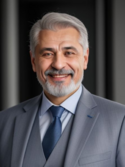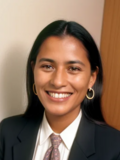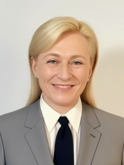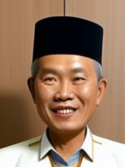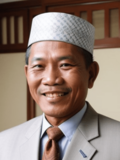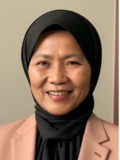Mukhlis Krasnaya Novogrody: Difference between revisions
North Alezia (talk | contribs) |
North Alezia (talk | contribs) No edit summary |
||
| Line 68: | Line 68: | ||
In the North Alezian Government under Aji Iliya's administration from 1969 to 1983, the elimination of NALG became a strong political priority. And in 15th of August 1977, the government raided the NALG offices at an underground bunker in Iskandaruddin and arrested most of its' members, including Mukhlis. However, Mukhlis' (back then) girlfriend Rinra successfully escaped along with the remaining members of the splintered NALG. Mukhlis was arrested for "Disrupting State Communications" and "Subversion" and put in the Mamazaldaruddin Extensive Security Prison. According to the Dictatorship's Plans which was leaked in 2009, Mukhlis was supposed to be executed in March 1978, then in June 1979, November 1979, and August 1980. However, this never came to fruition. | In the North Alezian Government under Aji Iliya's administration from 1969 to 1983, the elimination of NALG became a strong political priority. And in 15th of August 1977, the government raided the NALG offices at an underground bunker in Iskandaruddin and arrested most of its' members, including Mukhlis. However, Mukhlis' (back then) girlfriend Rinra successfully escaped along with the remaining members of the splintered NALG. Mukhlis was arrested for "Disrupting State Communications" and "Subversion" and put in the Mamazaldaruddin Extensive Security Prison. According to the Dictatorship's Plans which was leaked in 2009, Mukhlis was supposed to be executed in March 1978, then in June 1979, November 1979, and August 1980. However, this never came to fruition. | ||
During Mukhlis' arrest, his girlfriend Rinra continued where Mukhlis left off, writing critics, updating Mukhlis' past | During Mukhlis' arrest, his girlfriend Rinra continued where Mukhlis left off, writing critics, updating Mukhlis' past criticisms, and became the first woman to speak in the annual NALG jamming speech where she did so in 18th of August 1980. Even with the government's resentment against Mukhlis and the government's continuous failed attempts at arresting Rinra, the Ulema Council of North Alezia called for the government to let the two dissidents marry under Islamic law because "it's their right to marry". Eventually, Mukhlis and Rinra was married in 3rd of April 1981 at the Premier Aji Iliya's house under secretive circumstances and a guarantee that no arrests would be made (the threat was that if Rinra was arrested, the NALG would rebel instantly and that the Ulemas, which was the Iliya Family's important supporter, would pull back support). | ||
Aji Iliya would pass away in 1983, ending his dictatorial rule which was taken over by his brother Mika'il Iliya. Mika'il Iliya quickly took notice the need for democratization and liberalization of North Alezia in order to maintain the country's survival. And as such, under the approval of the State Council, agreed to "upgrade" Mukhlis' arrest from prison arrest to house arrest, which was met with a nonchalant reaction from Mukhlis decades later: | Aji Iliya would pass away in 1983, ending his dictatorial rule which was taken over by his brother Mika'il Iliya. Mika'il Iliya quickly took notice the need for democratization and liberalization of North Alezia in order to maintain the country's survival. And as such, under the approval of the State Council, agreed to "upgrade" Mukhlis' arrest from prison arrest to house arrest, which was met with a nonchalant reaction from Mukhlis decades later: | ||
| Line 176: | Line 176: | ||
One of the highest priorities of Mukhlis' first term as Premier is to end North Alezian isolationist policies which had happened for 30 years from 1958-1988. During that time, North Alezia was only tied to a foreign relationship with the United Kingdom and only limited contact with other countries. At this time, North Alezia finally joined the United Nations on 15th of December 1988, 30 years after its' neighbor South Alezia. | One of the highest priorities of Mukhlis' first term as Premier is to end North Alezian isolationist policies which had happened for 30 years from 1958-1988. During that time, North Alezia was only tied to a foreign relationship with the United Kingdom and only limited contact with other countries. At this time, North Alezia finally joined the United Nations on 15th of December 1988, 30 years after its' neighbor South Alezia. | ||
Around this time, Mukhlis also opened a foreign diplomatic relationship between North Alezia and Carrelie, where both countries had a similiar history of facing dictatorship and harsh rule. Mukhlis picked Carrelie due to its' position as an economic powerhouse in Europe and its' friendly position towards North Alezia. Mukhlis personally invited Carrelian singers to compete in [[AleziRadio Festival of Songs 1989]] and in return, AleziRadio broadcasted the Carrelian Songfestival of that year, which is the first foreign-made programme to be broadcasted freely in the country without censorship or "claim-covering" (a practice where North Alezian media would claim a foreign TV show as theirs, something Mukhlis made illegal in 1991). This relationship started the buliding blocks including with Malta Comino Gozo and Waisnor to create what would become the WMCA Alliance. | Around this time, Mukhlis also opened a foreign diplomatic relationship between North Alezia and Carrelie, where both countries had a similiar history of facing dictatorship and harsh rule. Mukhlis picked Carrelie due to its' position as an economic powerhouse in Europe and its' friendly position towards North Alezia. Mukhlis personally invited Carrelian singers to compete in [[AleziRadio Festival of Songs 1989]] and in return, AleziRadio broadcasted and competed in [[Songfestival 1989|the Carrelian Songfestival of that year]], which is the first foreign-made programme to be broadcasted freely in the country without censorship or "claim-covering" (a practice where North Alezian media would claim a foreign TV show as theirs, something Mukhlis made illegal in 1991). This relationship started the buliding blocks including with Malta Comino Gozo and Waisnor to create what would become the WMCA Alliance. | ||
Mukhlis visited Carrelie throughout his first term, and signed an agreement with the Carrelian government which is known in Carrelie as the "Wide Open Policy" and known in Alezia as the "International Openness Act of 1989" in order to cooperatively open their respective countries first to each other, then the entire world. Both countries experienced dictatorships, relative international isolation, and democratic and human rights backsliding before each country's dictatorship were toppled and the policy went into place. The cooperative saw both countries increase their interaction with each other in terms of democracy, culture, economy, healthcare, and education. | Mukhlis visited Carrelie throughout his first term, and signed an agreement with the Carrelian government which is known in Carrelie as the "Wide Open Policy" and known in Alezia as the "International Openness Act of 1989" in order to cooperatively open their respective countries first to each other, then the entire world. Both countries experienced dictatorships, relative international isolation, and democratic and human rights backsliding before each country's dictatorship were toppled and the policy went into place. The cooperative saw both countries increase their interaction with each other in terms of democracy, culture, economy, healthcare, and education. | ||
Mukhlis also created the country's first ever alliance with Yugoslavia and Indonesia in 1989 called the "Zafizamarrah-Jakarta-Belgrade Pact" or more well known as the "Triangle Pact" which emphasizes on economic and cultural exchange as potential developed economies of the future. The pact had only met twice, Jakarta in 1989, and Zafizamarrah in 1990. A third meeting in Belgrade in 1991 was scheduled, but the country's tumultuous condition at the time prevented the meeting from happening. Currently, the pact is still ongoing where Yugoslavia's seat is continued by Serbia. | Mukhlis also created the country's first ever alliance with Yugoslavia and Indonesia in 1989 called the "Zafizamarrah-Jakarta-Belgrade Pact" or more well known as the "Triangle Pact" which emphasizes on economic and cultural exchange as potential developed economies of the future. The pact had only met twice, Jakarta in 1989, and Zafizamarrah in 1990. A third meeting in Belgrade in 1991 was scheduled, but the country's tumultuous condition at the time prevented the meeting from happening. The pact was deactivated in 1992 during the conflict in Yugoslavia, and was only activated again by Alif Sadda in 2009. Currently, the pact is still ongoing where Yugoslavia's seat is continued by Serbia. | ||
==== Politics ==== | ==== Politics ==== | ||
| Line 286: | Line 286: | ||
==== The National Internet and Technology Project ==== | ==== The National Internet and Technology Project ==== | ||
According to his own biography, Mukhlis had tried the internet during his visit to the United States in 1995 and at that time, he called it an "eye-opening experience". After his arrival in Metropolitan Zafizamarrah two weeks later, Mukhlis started drafting the National Internet and Technology Project (NITP) which the purpose was to connect all North Alezia into the internet with reliable phone service and the following future infrastructure that may enhance the connectivity. According to Mukhlis, the internet is what North Alezia need to tie the country together due to how large and diverse the country is. Initial domestic and international reactions were skeptical due to how new the internet was at the time and the past assumption that the internet is a "fad" that will disappear soon enough. However, Mukhlis wanted the project to continue and construction on the enhancement of phone lines, satellites, and service to improve dial-up communications began in October 1995. Mukhlis' original vision were improved upon by future Premiers, even those with a different political alignment and the NITP would be completed in May 2012, making it Mukhlis' most successful programme and considered one of Alezia's most important and vital infrastructure projects in its' history. | According to his own biography, Mukhlis had tried the internet during his visit to the United States in 1995 and at that time, he called it an "eye-opening experience". After his arrival in Metropolitan Zafizamarrah two weeks later, Mukhlis started drafting the National Internet and Technology Project (NITP) which the purpose was to connect all North Alezia into the internet with reliable phone service and the following future infrastructure that may enhance the connectivity. According to Mukhlis, the internet is what North Alezia need to tie the country together due to how large and diverse the country is. Initial domestic and international reactions were skeptical due to how new the internet was at the time and the past assumption that the internet is a "fad" that will disappear soon enough. However, Mukhlis wanted the project to continue and construction on the enhancement of phone lines, satellites, and service to improve dial-up communications began in October 1995. Even as the 1997 Asian Financial Crisis struck, Mukhlis was (even with opposition back then) adamant on continuing the project. Mukhlis' original vision were improved upon by future Premiers, even those with a different political alignment and the NITP would be completed in May 2012, making it Mukhlis' most successful programme and considered one of Alezia's most important and vital infrastructure projects in its' history. | ||
Other than internet infrastructure, Mukhlis also launched an initiative to give ARICO larger opportunities to expand their technological capabilities and products and it too was deemed successful as 83% of Alezians at that time owns a cellular phone at the end of Mukhlis' premiership. The high penetration of cellular phone usage also promoted software creativity in which the Alezian Union is still known for to this day. One of the most famous products that was developed during this era is Arico.Net, which has been used to promote E-Governance in North Alezia and the Alezian Union in the future, and has expanded overseas to limited international usage in various countries. | Other than internet infrastructure, Mukhlis also launched an initiative to give ARICO larger opportunities to expand their technological capabilities and products and it too was deemed successful as 83% of Alezians at that time owns a cellular phone at the end of Mukhlis' premiership. The high penetration of cellular phone usage also promoted software creativity in which the Alezian Union is still known for to this day. One of the most famous products that was developed during this era is Arico.Net, which has been used to promote E-Governance in North Alezia and the Alezian Union in the future, and has expanded overseas to limited international usage in various countries. | ||
==== The Economy and the 1997 Asian Financial Crisis ==== | ==== The Economy and the 1997 Asian Financial Crisis ==== | ||
Mukhlis' second term of Premiership was also challenged by the 1997 Asian Financial Crisis which struck Alezian regional partners such as South Korea and Indonesia. During this time, Mukhlis used his political position in the State Council to create the North Alezian Emergency Financial Package of 1997. The Emergency Financial Package implemented conservative cuts to Mukhlis' previous welfare program that while caused minor protests by the Alezian public at the time, created enough funds to save North Alezia from financial crisis even though the economy contracted 1.5% in 1998. One of the factors of Mukhlis' success responding to the crisis is due to productive political discussion in the State Council mainly between the Socialists and the Conservatives with the Liberal-Democrat councillors as middle-men. | Mukhlis' second term of Premiership was also challenged by the 1997 Asian Financial Crisis which struck Alezian regional partners such as South Korea and Indonesia. During this time, Mukhlis used his political position in the State Council to create the North Alezian Emergency Financial Package of 1997. The Emergency Financial Package implemented conservative cuts to Mukhlis' previous welfare program that while caused minor protests by the Alezian public at the time, created enough funds to save North Alezia from financial crisis even though the economy contracted 1.5% in 1998. One of the factors of Mukhlis' success responding to the crisis is due to productive political discussion in the State Council mainly between the Socialists and the Conservatives with the Liberal-Democrat councillors as middle-men. Other than introducing cuts to the social policies that Mukhlis previously implemented, the second period of Mukhlis' economy policy involves giving subsidies and tax cuts to corporations and factories in order to give them incentives to use local natural resources and population. As a result, the expected 23% unemployment rate in 1998 got lowered to 11% which allowed the North Alezian employment sector to quickly recover. Additionally, the Bank of Alezia allows the North Alezian Dollar to fall by 20% to keep Alezian products cheap overseas and raised interest rates to a back then 10-year high of 83% which was subsequently lowered in 1998. | ||
However, the economical challenges facing Southeast Asian countries and South Korea forced the Alezian trade surplus which had been maintained since 1991 to fall by 68% which made Mukhlis push into opening much more trade with "Western" economies such as the United States, European Union, and including separate trade agreements that would turn into the [[WMCA Alliance]]. | |||
Due to these policies, North Alezia is one of the countries in Eastern and Southeastern Asia to never ask for an IMF bailout during the 1997 Asian Financial Crisis. Additionally, the North Alezian public still considers Mukhlis as the Premier that saved the North Alezian economy (although Mukhlis himself asked the public to also thank the National Council and the related ministries because Mukhlis commented that he's "not from the economic segment of the country") | |||
==== 1998 AleziRadio Corruption Case ==== | |||
On 13th of February 1998, the Alezian Intelligence Services (ALIS) released a personal report to Mukhlis regarding the possibility of corruption in the North Alezian state broadcaster, AleziRadio (AR). According to the report which was made public in 2018, the higherups of AleziRadio has stolen approximately US$ 4.4 billion to be allocated to higherups equally from the Public Broadcasting Tax of January 1998. The report has suggested that the management side of the company plans to continue taking 4.4 billion monthly until an unknown month. | |||
According to accounts by his son Robi, Mukhlis reacted furiously to the report. Robi commented that during that time, he's never "seen his father this angry, and yet he never took it out on us, instead leaving to his room. But we can hear him scream at that time and a chair was broken at that time impacting on his room's bedframe". Mukhlis later confirmed this saying that he regretted that he got that angry, however he said that he's not sorry for taking action. Mukhlis' consideration to open an investigation is both due to AleziRadio's position as a State-Owned Enterprise and due to how North Alezia was still slowly recovering from the 1997 Asian Financial Crisis, commenting that "the last thing North Alezia needs right now, is the largest corruption case in Democratic North Alezia's history". | |||
The investigation held by the State Council, the Ministry of Administrative Affairs, and the Federal Anti-Corruption Comission resulted in a finding pointing the management of AleziRadio responsible for the loss of US$ 4.4 billion and an additional US$ 1.7 billion loss on previous months. A finding by ALIS also revealed a secret conversation by the AleziRadio management discussing smuggling the funds into "any of the tax havens we can find". All of the higher management officers of AleziRadio got summoned to the High Court of North Alezia on 3rd of March 1998 and was found guilty. Initially, a death sentence was issued, but after pleading by the perpetrators, Mukhlis lowered it to life sentence without parole and freezing of funds. | |||
The case and the subsequent arrests caused AleziRadio to be left without leadership. And as such, under the recommendation by the State Council, Mukhlis launched Nakaz 19/1998 and froze AleziRadio's funds and operations, to be turned and transferred into a new, much more independent and transparent, national broadcaster. This would become the [[Alezian Broadcasting Authority]]. | |||
==== Mukhlis' Refusal to Run for a Third Term ==== | |||
Due to Mukhlis' implementation of policies that both saved the North Alezian economy and liberalized the newly democratic North Alezia, a survey held in January 1998 by Watch Herald indicated that 83% of North Alezians wanted Mukhlis to be Premier for a third term or atleast have Mukhlis compete in the Premiership Elections again. However, on the newly established ABA Newsreel of 18th of March 1998, Mukhlis announced: | |||
{{Quote|text=I understand that people still wanted me to become Premier. But it's time for me to leave Government Way. Two periods has passed, and by law, I couldn't have three, and I am not interested in changing our constitution. It's time for me to focus on my family and my friends. | |||
Additionally, while we, thanks to our friends and opposition in the Government, have made a lot of people happy, there are still quite some people who has legit criticism against my government, and if I stayed, I'd just disappoint more people. I'm sorry, but this is my decision. Call me if you need me, but I'm not going to let myself hold onto power for too long.|sign=Mukhlis Krasnaya Novogrody|source=ABA NewsReel}} | |||
Mukhlis' refusal to compete for a third term and his refusal to change the constitution was met with shock by North Alezians. However, this installed a much more respectful political environment where the 1998 election was deemed as the electing of someone who can continue after Mukhlis. Mukhlis also broke normal North Alezian political expectations by resigning as the chairman of the Liberal Democratic Party and remaining silent on the Liberal Democratic primaries, instead letting the party choose Nuh Saharifin as their candidate without Mukhlis' input. | |||
After Premiership, Mukhlis would continue disappearing and appearing in North Alezian politics, oftentimes giving criticism and insight towards future governments. | |||
== Post-Premiership == | == Post-Premiership == | ||
Revision as of 03:54, 29 June 2024
Mukhlis Krasnaya Novogrody OGZ, OD | |
|---|---|
Мухлис Красная Новогороды ᨆᨘᨖᨒᨗᨔ ᨀᨑᨔᨊᨕᨗᨕ ᨊᨚᨄᨚᨁᨑᨚᨉᨗ | |
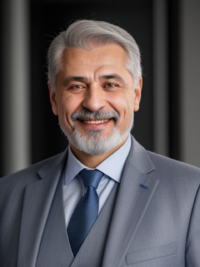 | |
| 6th Premier of the Federation of North Alezia | |
| In office October 22, 1988 – October 22, 1998 | |
| Preceded by | Mika'il Iliya |
| Succeeded by | Dariq Authoriq |
| Personal details | |
| Born | October 7, 1947 Noshvaldzar, Pyalivostok, British Alezia |
| Political party | Liberal-Democratic |
| Spouse(s) | Andi Rinra Manriattang (m. 1981, died 2010) |
| Children | Andi Robi Idris Novogrody Andi Ainii Irqimaza Novogrody |
| Residence | Metropolitan Zafizamarrah |
| Alma mater | University of Zafizamarrah (graduated 1971 in International Relations) |
| Occupation | Lecturer of International Relations in University of Zafizamarrah (2009-present) Honorary Advisor of the Liberal-Democratic Party of the Alezian Union (2021-present) Music Composer Voiceover Artist |
| Signature | |
Mukhlis Krasnaya Novogrody (born in October 7, 1947) or more well known and personally prefered to be called by his first name Mukhlis or his abbreviation MKN is an Alezian politician, musician, actor, and university lecturer who served as the Premier of the Federation of North Alezia from 1988 to 1998. A leader of the Liberal Democratic Party of North Alezia (pre-reunification from 1988-2001), Mukhlis now acts as a honorary advisor within the Liberal Democratic Party of the Alezian Union since reunification.
Mukhlis raised to popularity after leading the North Alezian Revolution of 1987-1988 and became a popular politician after he was credited for saving the Alezian economy and social structure with his "Liberal in our economy, Social in our humanity" ideology, which would eventually form the basic tenets of "Mukhlisism". Mukhlis was considered "the Father of Alezian Democracy"
Mukhlis is the first ever premier in North Alezia to be elected democratically and the first to be reelected democratically. Both of Mukhlis' terms were received highly within the Alezian public, due to Mukhlis' economic liberalization and legalisation of further personal freedoms within the country in addition to restarting North Alezian foreign policy through the Triangle Pact and agreements with Carrelie, Waisnor, and Malta Comino Gozo which would become the base for the WMCA Alliance.
Although both of Mukhlis' terms has been generally approved with high approval ratings in North Alezia, both terms would be marred by the 1998 AleziRadio corruption case, negative environmental impacts including the failure to address whaling in North Alezia, and inadequate labour laws. Due to his administration's failure and neglect of the Reunification issue, Mukhlis was in contrast, highly unpopular in South Alezia. He's often called "the Margaret Thatcher for South Alezia" due to his administration's preference to save the North Alezian economy than help South Alezia through reunification which the region desperately needed at the time under the dictatorship of General Hoojvinken. The question of whether Mukhlis Krasnaya Novogrody should be considered a hero or not remained a strong question in contention between North and South Alezians.
Early Life
Mukhlis Krasnaya Novogrody was born in Noshvaldzar, Pyalivostok, British Alezia to pop singer Aziz Goridagyev Novogrody and Isanayran "Isa" Aliyeva Novogrody (nee Maliyenskova). Aziz Goridagyev Novogrody is most well known for being the only person to have won AleziRadio Festival of Songs three times: in 1958, 1969, and 1977. Isa meanwhile was pretty well known in the peaceful North Alezian independence movement against the British from the 1930s to its' independence in 1958.
Mukhlis commented that his parents endured "undescribable" hardship during his early childhood days. During that time, Alezia was devastated by World War II and the subsequent losses in the Alezian economy after successfully fending off a Japanese invasion into the Alezian Isles.
Mukhlis lived a normal, albeit harsh childhood back then, with his parents arguing whether Mukhlis should continue his father Aziz's career as a singer or join politics like his mother Isa. Mukhlis eventually had to move along with his uncle Iosif Marienkov Novogrody to Pyalivostokgrad in order to receive education in there. In the capital of Pyalivostok, Mukhlis received education in the Pyalivostokgrad Royal British-Russian School (PBRS). During his education in the city, Mukhlis noticed the atmosphere of "a country that's going to be independent soon". This would end up being the reality as during that time, negotiations of an independent North Alezia between Alezians and the United Kingdom would be initiated and resulted in a successful draft of a constitution.
During his formative years, Mukhlis joined the PBRS School Choir, where he sang tenor during his duration of education there. He also learned the guitar, the violin, and learned three other languages after English and Russian (French, German, and Arabic) which he mastered after finishing PBRS. Mukhlis throughout his early and middle education was considered as a smart student with strong potential.
In 1958, as Mukhlis reached 11 and the Iliyan Dictatorship was installed, Mukhlis' educational quality plummeted to the point where he felt that he "could not rely fully on school anymore" and while he continued his formal education and graduate from PBRS (after 1958 called the Pyalivostokian School) would receive tutelage about various topics from his parents and uncle Iosif. Iosif would eventually help shape Mukhlis' personality and political ideology as someone who could not be tied to an iron-fisted leader which would shape Mukhlis' liberal values. Mukhlis' mother Isa taught Mukhlis the basic of politics and international law which shaped his interest in that subject.
College Years and Introduction into Politics
The North Alezian educational system at that time requires potential university students to write a 1000-word essay on any topic of their choice. When it became possible to do so economically and officially, Mukhlis wrote his essay titled "What Could've Been Done in Alezian Foreign Politics in Relation to the United Kingdom" and criticized the Iliyan Dictatorship regarding its' closed-door policy in relation to its' foreign policy. Mukhlis commented at how he was "walking on thin ice" while writing the essay due to the danger of possibly offending the Iliyan family within those critical literature that he's writing.
Eventually, Mukhlis successfully submitted his essay and would be admitted into the University of Zafizamarrah in 1964 within its International Relations department which was still new at the time. According to his fellow classmates, at that time, Mukhlis showed potential and was considered a potential member of the Alezian Diplomatic Corps after he wrote in the University of Zafizamarrah's newspaper "The Light". However, according to an interview with the Alezian Broadcasting Authority (ABA) in 2022, Mukhlis mentioned that his years studying in University was "tumultuous and problematic".
During this time, Mukhlis was secretly considered a danger to Alezian society by the Rectorate of the University of Zafizamarrah. And as such, Mukhlis started losing his rights to write in "The Light" and was considerably hindered during his university progress through intentional bureaucratic problems and harshened graduation rules. And as such, Mukhlis couldn't graduate on time together with his fellow classmates and had to graduate 3 years later than his peers, in 1971. Other acts of discrimination by the administration includes the increase of fees Mukhlis was required to pay in order to continue his studies.
Mukhlis commented in his interview with the ABA in 2022 that Mukhlis knew what was going on, but he didn't want to "cause drama" with the university knowing that the Iliyan Dictatorship would back the university administration compared to him. However, he also commented that he "still wanted to do something about it". In 1967, Mukhlis joined the underground "Political Students Association for the Liberation of North Alezia" (PSALNA, now Alezian Political Student Association / APSA) and got to secretly visit (back then) democratic Kingdom of South Alezia, which back then, was an illegal thing to do and could warrant his execution. However, during the Iliyan Dictatorship, he never got arrested throughout his university years.
Pre-Premiership
Subversion against Iliya and Arrest
During Mukhlis' days in PSALNA, Mukhlis acted as a writer for their secret newspaper "Sportspage" (intentionally called as such in order to avoid detection by the North Alezian dictatorship), where he with full freedom, started writing critique against the dictatorship in a stronger, much more "direct" tone. During his time as a newspaper writer, Mukhlis would criticize the Iliya's "Unholy Trinity of Hindering North Alezian Progress": Corruption, Authoritarianism, and Hatred. The paper would end up spread among the ranks of dissent within the North Alezian populace which made Mukhlis popular among them. Eventually, he rose through the ranks fast enough that he would end up being the chairman of PSALNA for a one-year term from 1970 until his eventual graduation in 1971.
In 1972, Mukhlis was secretly contacted by the bigger, much organized organization called the North Alezian Liberation Group (NALG) asking him if he would be interested in writing for them. Mukhlis accepted the deal and would end up writing very scathing criticism against the Iliyan Dictatorship (specifically the Premier of North Alezia from 1969-1983 Aji Iliya) for the NALG. During his time in the NALG, Mukhlis would meet with Andi Rinra Manriattang, a fellow critic against the dictatorship especially in her own department of architecture.
Eventually, Mukhlis was selected to address the public secretly through the jamming of AleziRadio in the 1974 Premiership Speech by Aji Iliya. During the 15 minutes NALG jammed the state-owned radio, Mukhlis publicly, albeit with a hidden identity, criticized the Iliyan Dictatorship for hurting the Alezian population, destroying life by strangling the basic tenets of freedom. During this, the North Alezian populace quickly called the voice "the Angel" without knowing the man behind the voice.
In the North Alezian Government under Aji Iliya's administration from 1969 to 1983, the elimination of NALG became a strong political priority. And in 15th of August 1977, the government raided the NALG offices at an underground bunker in Iskandaruddin and arrested most of its' members, including Mukhlis. However, Mukhlis' (back then) girlfriend Rinra successfully escaped along with the remaining members of the splintered NALG. Mukhlis was arrested for "Disrupting State Communications" and "Subversion" and put in the Mamazaldaruddin Extensive Security Prison. According to the Dictatorship's Plans which was leaked in 2009, Mukhlis was supposed to be executed in March 1978, then in June 1979, November 1979, and August 1980. However, this never came to fruition.
During Mukhlis' arrest, his girlfriend Rinra continued where Mukhlis left off, writing critics, updating Mukhlis' past criticisms, and became the first woman to speak in the annual NALG jamming speech where she did so in 18th of August 1980. Even with the government's resentment against Mukhlis and the government's continuous failed attempts at arresting Rinra, the Ulema Council of North Alezia called for the government to let the two dissidents marry under Islamic law because "it's their right to marry". Eventually, Mukhlis and Rinra was married in 3rd of April 1981 at the Premier Aji Iliya's house under secretive circumstances and a guarantee that no arrests would be made (the threat was that if Rinra was arrested, the NALG would rebel instantly and that the Ulemas, which was the Iliya Family's important supporter, would pull back support).
Aji Iliya would pass away in 1983, ending his dictatorial rule which was taken over by his brother Mika'il Iliya. Mika'il Iliya quickly took notice the need for democratization and liberalization of North Alezia in order to maintain the country's survival. And as such, under the approval of the State Council, agreed to "upgrade" Mukhlis' arrest from prison arrest to house arrest, which was met with a nonchalant reaction from Mukhlis decades later:
I mean, thanks for releasing me, but the word "arrest" was still there and North Alezia back then was not free yet under those "reforms".
— Mukhlis Krasnaya Novogrody, That's Tea, 18th of May 2022
During his house arrest, Mukhlis was not allowed to leave North Alezia, but he was allowed to restart his writing career. In his writings since 1983 until before the 1987-1988 revolution, Mukhlis welcomed the reforms but commented that it's not enough and call for an actual democracy that allows more than "three preapproved political parties with fixed results that won't help the country mature". During this time, pro-Iliya populace demanded that Mika'il Iliya reinstated Mukhlis' arrest. However, Mika'il said that "without a strong opposition like Mukhlis, there won't be any Alezia in the next 15-20 years".
Eventually, in 18th of November 1986, Mika'il Iliya announced that he'll reinstate compulsory military service, which was considered a "political suicide" and an opportunity for the NALG and Mukhlis.
North Alezian Revolution of 1987-1988
Mukhlis used the opportunity of Mika'il Iliya's "political suicide" to call in the North Alezian people to "fight and return North Alezia to democracy as promised in 1957", addressing poverty and lack of freedom in the annual 1987 NALG jamming speech in 16th of May 1987, marking it as the starting date for the North Alezian Revolution of 1987-1988. Members of the NALG and the public broke into Mukhlis' house in 18th of July 1987 and asked him and Rinra to lead the rebellion against the Iliyan regime. During this time, clashes broke out between the NALG and the public against the Iliyan Riot Police. Members of the North Alezian Parliament during this time started to revolt and break party line and demanded a Motion of No Confidence against Mika'il Iliya, which was proposed but didn't receive enough votes in December 1987.
Mika'il Iliya would end up being reelected in 11th of January 1988 on North Alezia's 8th Premiership Elections. Most of the public boycotted the vote and declared the election as a "sham" and "invalid", which further intensified the clashes. Mika'il Iliya would end up resigning on 19th of February 1988 and said that he "didn't mind a caretaker government to take over" and wished it good luck.
Preparation for the May 1988 General Elections and Victory
After negotiation that took a month after Mika'il Iliya's resignation, the Iliyan family transferred sovereignty to the NALG who promised to hold free and fair elections in May 1988 and giving Daranim Mudzammar the responsibility as interim premier from 19th of March 1988 until the election on 5th of May. Mukhlis was initially reluctant to run for Premiership, especially considering that he was without a political party. However, public demand and pushes from the Caretaker NALG Government pushed Mukhlis to run for Premiership in 27th of March 1988.
During the period from March to May 1988, Mukhlis announced the creation of the Liberal Democratic party and continued to campaign with as little resources as he can get due to the problems surrounding the North Alezian economy due to mismanagement from the past Iliyan governments and welcomed Conservative Andi Fasrullah, Socialist Nusran Aidira, and Nationalist Asman Di'arul to compete with him fairly as he will for them. All three suggested that they wanted Mukhlis to become their Foreign Minister should one of them defeat Mukhlis.
| Candidate | Party | Votes | % | |
|---|---|---|---|---|
| Mukhlis Krasnaya Novogrody | Liberal-Democratic Party of North Alezia | 30,982,364 | 59.32 | |
| Andi Fasrullah | Conservative Party of North Alezia | 9,255,015 | 17.72 | |
| Nusran Aidira | Socialist Party of North Alezia | 9,150,557 | 17.52 | |
| Hasman Di'arul | Nationalist Party of North Alezia | 2,841,269 | 5.44 | |
| Total | 52,229,205 | 100.00 | ||
Mukhlis won the election by a majority of 59%, which meant that a second round was not needed and Mukhlis was elected Premier of North Alezia. Political analysis from the time suggested that reasons behind Mukhlis' victory was varied, most suggested that he won the election due to the familiarity of the North Alezian people with Mukhlis' voice when he used to jam AleziRadio broadcasts for the annual jammed NALG speech, others due to the promise the new Liberal-Democratic party would bring instead of the Conservatives and Socialists which was deemed a "more independent version of the Patriotic and Workers parties respectively" and the Nationalists which was deemed a "remnant of the Iliyan Dictatorship".
Premiership
| Year | Premier | Zafizamarrah | Aramna | Bristol | Pyalivostok | Tel Hadiv | Basna |
|---|---|---|---|---|---|---|---|
| 1988-1993 | Mukhlis Krasnaya Novogrody
(Liberal Democratic) |
Ryazanuddin Khatan
(Liberal Democratic) |
Maria Benislan Alvanavais
(Liberal Democratic) |
Sir James Maxlington
(Conservatives) |
Lena Alioskonova
(Socialist) |
Beniamino Littauer
(Liberal-Democratic) |
Nafsiah Putri Ayu
(Conservatives) |
| 1993-1994 | Andi Alaina Mahmudinah
(Liberal Democratic) |
Sir Maxwell Thorpeswell
(Conservatives) |
Benjamin Weissmann
(Conservatives) |
Halim Sa'id Soepraptono
(Conservatives) | |||
| 1994-1996 | Sir Michael Garslington
(Liberal Democratic) |
Alimuddin Rastonoputra
(Patriots) | |||||
| 1996-1998 | Suratnasri Pudjiantara
(Grand Consensus) |
First Term of Premiership (1988-1993)
North Alezia is now free from dictatorship. Our current issue to face is how we maintain our freedom and free ourselves from the issue that challenges us as an entire country ready to throw ourselves out there
— Mukhlis Krasnaya Novogrody, 1988 Premiership Inauguration Speech
Mukhlis was inaugurated Premier on the 12th of November 1988 and immediately called the other six semi-democratically appointed (as regional elections would only be held in 1993) regional leaders to form the new National Council and a new cabinet in 19th of November 1988. The newly democratically elected parliament was sworn in by Mukhlis and the State Council on the 3rd of December 1988.
During his first months of Premiership, Mukhlis was deemed nearly unprepared for Premiership, and political commentary at the time suggested that Mukhlis might not survive his first term. However, throughout his first term, Mukhlis kept searching for multipartisan support in order to secure his programmes on time, which was successful enough to keep Mukhlis' first term focused and enough to "save the country from past Iliyan rule".
Economy
The first term of Mukhlis' Premiership involves his initiatives to save the North Alezian economy which at that time was severely isolated, ridden with inflation and high prices, and corrupt levels of taxation in all administrative stages within the North Alezian Government. During this time, Mukhlis launched an intense liberalization and democratization campaign within the North Alezian economy, opening economic trade routes that was previously closed by the Iliyan Dictatorship (under the guise of safety and political sovereignty) and allowing trade with even more countries, practically ending Alezian economic isolationism within his first five years of premiership.
Mukhlis also launched a strong anti-corruption campaign within his government, launching the Anti-Corruption Board of North Alezia (now the Anti-Corruption and Improper Economic Practice Board of the Alezian Union) which saved public expenditures by 32% and improved GDP from 1988 to 1993. At this time, Mukhlis also launched a "Take Safely, Pay Safely" campaign which promoted healthy understanding within the Alezian public and government of public and national debt and promote the government's promise to avoid exceeding the national debt limit and commit to proper pay time, which improved North Alezian credit ratings from D to BB+ by the end of his first term in 1993.
Mukhlis also launched an intense infrastructure campaign throughout North Alezia. During his first term, Mukhlis completed a long overdue megaproject which would end up becoming the AZ-01 highway from Nurahlan, ZF and passing through the southern part of North Alezia to Pantai Barustaga, BN. Other than that, he also started a construction on five new international airports including one that would end up becoming MKN International Airport in Oldport-Newport. Mukhlis also expanded shipping routes, railroads, and telephone lines at this time.
Around this time, Mukhlis also pushed for liberalization and privatisation of several Alezian companies in order to push for competition in the newly liberalized North Alezian economy. However, Mukhlis at his first term was also consistent in ensuring that the nation still gets to compete along with the newly privatized corporations in order to ensure a public-private economic balance.
Foreign Policy
One of the highest priorities of Mukhlis' first term as Premier is to end North Alezian isolationist policies which had happened for 30 years from 1958-1988. During that time, North Alezia was only tied to a foreign relationship with the United Kingdom and only limited contact with other countries. At this time, North Alezia finally joined the United Nations on 15th of December 1988, 30 years after its' neighbor South Alezia.
Around this time, Mukhlis also opened a foreign diplomatic relationship between North Alezia and Carrelie, where both countries had a similiar history of facing dictatorship and harsh rule. Mukhlis picked Carrelie due to its' position as an economic powerhouse in Europe and its' friendly position towards North Alezia. Mukhlis personally invited Carrelian singers to compete in AleziRadio Festival of Songs 1989 and in return, AleziRadio broadcasted and competed in the Carrelian Songfestival of that year, which is the first foreign-made programme to be broadcasted freely in the country without censorship or "claim-covering" (a practice where North Alezian media would claim a foreign TV show as theirs, something Mukhlis made illegal in 1991). This relationship started the buliding blocks including with Malta Comino Gozo and Waisnor to create what would become the WMCA Alliance.
Mukhlis visited Carrelie throughout his first term, and signed an agreement with the Carrelian government which is known in Carrelie as the "Wide Open Policy" and known in Alezia as the "International Openness Act of 1989" in order to cooperatively open their respective countries first to each other, then the entire world. Both countries experienced dictatorships, relative international isolation, and democratic and human rights backsliding before each country's dictatorship were toppled and the policy went into place. The cooperative saw both countries increase their interaction with each other in terms of democracy, culture, economy, healthcare, and education.
Mukhlis also created the country's first ever alliance with Yugoslavia and Indonesia in 1989 called the "Zafizamarrah-Jakarta-Belgrade Pact" or more well known as the "Triangle Pact" which emphasizes on economic and cultural exchange as potential developed economies of the future. The pact had only met twice, Jakarta in 1989, and Zafizamarrah in 1990. A third meeting in Belgrade in 1991 was scheduled, but the country's tumultuous condition at the time prevented the meeting from happening. The pact was deactivated in 1992 during the conflict in Yugoslavia, and was only activated again by Alif Sadda in 2009. Currently, the pact is still ongoing where Yugoslavia's seat is continued by Serbia.
Politics
Mukhlis did everything in his power to consolidate North Alezian politics at the time. Publicly, he stated that he wanted to work together with the opposition in order to maintain national democracy and decorum in the newly democratized North Alezia. The decision by Mukhlis to maintain the directorial system of government is deemed as a surprise by many, with Mukhlis reasoning that the State Council maintains democracy and makes sure that all regions gets to be represented in North Alezian politics.
During his first term, Mukhlis had to face intense opposition from the Socialists and Conservatives side of the North Alezian government. His first term included three Liberal-Democratic councillors (Zafizamarrah, Aramna, and Tel Hadiv), one Socialist (Pyalivostok), and two Conservatives (Basna and Bristol). The term is filled with arguments between the Socialists and Conservatives proposing separate arguments and tip the Liberal-Democrats and Mukhlis towards their side due to the rule of the National Council to hold a majority vote in order to legalize a legislation. Mukhlis tends to align with progressive policies which usually means that Liberal-Democrats and Socialists would tend to vote together in terms of social issues, while Liberal-Democrats would tend to vote together with Conservatives in terms of economy issues.
Around this time, the question of Daya Island regionhood has been put into question multiple times. According to political analysts at the time, on all occassions where Mukhlis was asked regarding whether he'll support Daya Island regionhood, Mukhlis tends to answer in a cryptic tone. At an interview with AleziRadio on 1990, Mukhlis commented, "I don't believe that Daya Island is ready for regionhood right now, but what I think they're ready for is further autonomy from Pyalivostok in terms of their own affairs". Mukhlis also supported the equal usage of Finnish, Swedish, and Russian in the area.
Mukhlis also boosted democratic governance in North Alezia at the time, quickly signing a Nakaz that allows for the expansion and creation of a strong and diverse multiparty democracy that would eventually become the tenets of North Alezian, then future Alezian democracy.
Social Policies
Mukhlis immediately reversed most of the Iliyan government's reluctance on improving living standards for the North Alezian populace. One of the primary reasons why Mukhlis launched into intense economic growth plans was to quickly improve living standards and wages. Around this time, Mukhlis focused primarily on saving North Alezia's education system by proposing to reform the current curriculum to introduce a more "holistic" approach to teaching and removing "rigidness" in North Alezian education which includes corporal punishment and school uniform. Initially, the curriculum plan receives opposition from the conservative side of the North Alezian government. However, negotiations resulted in the North Alezian Curriculum of 1988 which was considered as a revised and less progressive version of Mukhlis' plan. While the curriculum introduces technology and bans corporal punishment in schools, the law still requires school uniforms and limit personal rights to an extent. The requirement on school uniforms wouldn't be lifted until Alif Sadda signed its' lifting in 2009.
Another main point of Mukhlis' first term as Premier is wages and working standards. Once again, the conservative side of the North Alezian government proved to be a challenge for Mukhlis' progressive plans to save the North Alezian labour force. However, Mukhlis signed an agreement with socialist member of the State Council for Pyalivostok Lena Alioskonova in order to gain socialist support on Mukhlis' wage and workplace plans which means that Mukhlis' wage and working standards plan got legalized as Nakaz 44/1988. Initial opposition existed in the government mostly from corporate owners and conservatives even with Bristolian member of the State Council at the time Sir James Maxlington in 1990 calling Mukhlis "a spineless socialist who don't actually care about the market". Mukhlis responded by saying "If we don't raise wages and working standards, no one's going to buy your products from your companies because no one gets money or they're too sick or tired to shop. Give it time." Nakaz 44/1988 proved to be another one of Mukhlis' successes where wages improved by 292% throughout his first term and per capita earning jumped from $1,822 in 1988 to $4,174 in 1993. Working hours and work benefits also improved during this time.
1993 Premiership Election
| Candidate | Party | Votes | % | Votes | % | |
|---|---|---|---|---|---|---|
| Mukhlis Krasnaya Novogrody | Liberal-Democratic Party of North Alezia | 23,952,465 | 32.29 | 53,739,237 | 73.32 | |
| Alsani Ma'ruf | First Party of North Alezia | 16,393,604 | 22.10 | 19,554,867 | 26.68 | |
| Dariq Authoriq | Socialist Party of North Alezia | 11,549,702 | 15.57 | Endorsed Mukhlis | ||
| Andi Ahmad Hariq-Arnataulić | Creative Party of North Alezia | 7,633,040 | 10.29 | Endorsed Mukhlis | ||
| Andi Fasrullah | Conservative Party of North Alezia | 6,995,099 | 9.43 | Endorsed Ma'ruf | ||
| Suhardi Daradjat | Patriotic Party of North Alezia | 5,348,321 | 7.21 | Endorsed Ma'ruf | ||
| Zahra Yudhana | Millenium Party of North Alezia | 2,306,973 | 3.11 | Endorsed Mukhlis | ||
| Total (Registered Votes) | 74,179,205 | 100.00 | 73,294,104 | 100.00 | ||
Throughout the 1992-1993 Campaign Period, Mukhlis traveled all around North Alezia which in the past was almost unheard of in Alezian democracy. During this time, Mukhlis was generally not as fierce in campaigning compared to his competitors especially from the First Party's candidate Alsani Ma'ruf. Mukhlis reelection in 1993 was not considered as a surprise, however the surprise came in the second round of voting. Initially Mukhlis was not endorsed by any other party while Alsani Ma'ruf gained support from the Conservative Party and the Patriotic Party as fellow centre-right to right-wing parties at that time.
During this time of the possibility of Mukhlis losing his Premiership seat even with him winning the first round, other than his fellow Liberal-Democrats, Mukhlis was also highly favoured by progressives which gained him the support from the Creative Party and Millenium Party. However, the "Alezian Political Shock of 1993" would happen when the Socialist Party who was predicted to stay neutral, supported Mukhlis in the second round. Additionally, some parts of the conservative wing of Alezian politics (including Mukhlis' political rival and elected Councillor for Bristol Sir Maxwell Thorpeswell) defected to support Mukhlis which caused a rift in Alsani Ma'ruf's second round campaign.
Eventually, Mukhlis would be reelected with a high 73.32% of votes which at that time was a "shocking but welcomed" result by North Alezians. This cemented Mukhlis' political influence and his ability to act as a "politician for all Alezians".
Second Term of Premiership (1993-1998)
Challenging Beginnings
After his reelection, Mukhlis was immediately faced with intense challenge in all sides of his government. After the 1993 election concluded, Mukhlis had to face losing Tel Hadiv as a Liberal-Democratic region who turned into a Conservative region. This means that the State Council now has an opposition majority of 3 Conservatives and 1 Socialist against 2 Liberal-Democrats which according to his autobiography, he consider as a "hellhole-ish situation". However, he also wrote in his autobiography that he refuses to do anything to change it because "there's no point in opposition if they can't make my job a bit more hellhole-ish". Mukhlis also credited Conservative member for Bristol Sir Maxwell Thorpeswell for being "his greatest opposition and friend" throughout his second term.
Other than the complicated political start, Mukhlis' administration was also tested by the 1993 Basna Tsunami and the 1993-1994 Basna Political Crisis. Mukhlis immediately responded by visiting Kencana Perangkai, BN as the worst affected area and directly helped the evacuation process, even with Premiership Guard's advice for him not to. Mukhlis also went overseas to ask for foreign aid in regards of funding Basna's recovery and also directed an unanimous vote by the State Council to help Basna recover which helped the region to fully recover 3 years earlier than predicted. However, the destruction and the slow regional response that forced the federal government to act caused Basnaharian distrust towards their own regional government which caused the 1993-1996 Basna Political Crisis.
1993-1994 Basna Political Crisis
Nafsiah Putri Ayu was initially reelected for her second term as Governor of Basna and the State Council member for Basna. However, her administration's poor leadership and poor response towards the 1993 Basna Tsunami caused major public distrust which was responded by Ayu announcing her resignation as Governor in 18th of August 1993 and taken over by fellow Conservative Halim Sa'id Soepraptono. Mukhlis allegedly told Soepraptono at a secret State Council meeting in 1993 that Soepraptono has his support in recovering Basna and asked him to "avoid controversy and conflict and to just try work through 1993 safely". However, much to Mukhlis' criticism and dismay, Soepraptono withheld public aid amounting to AZ$ 165 million to areas that didn't vote Conservative in the latest election. This decision was met with rage from Mukhlis who vehemently criticized Soepraptono for "destroying a part of North Alezia". Critics also arose from Conservatives from within Basna and also from other regions, including a leaked personal reprimand from Thorpeswell and Weissmann, conservative councillors from Bristol and Tel Hadiv respectively:
Have you realized what you've done?! Thank you very much for destroying the Conservative Party! When a Liberal-Democrat like Mukhlis did so much more for Basna than you did, that's a complete disaster! May we remind you that Mukhlis is Pyalivostokian? Please contemplate that.
— Benjamin Weissmann, member of State Council for Tel Hadiv, A leaked CCTV video of conversation between Thorpeswell and Weissmann against Soepraptono recorded on 18th of February 1994
Soepraptono's low approval ratings was used by the Patriotic Party at the time to lodge a motion of no confidence against Soepraptono in 7th of June 1994. The Patriots' motion of no confidence was deemed as either "a shock" or "backstabbing" by political analysts at the time due to the Patriotic Party's general alignment and cooperative stance with the Conservative Party at the time. The motion was supported by all parties except for Conservatives who still support Soepraptono and didn't dissent. A procedure like this would normally call for early elections. However, due to the difficulty of holding a public election at that time due to infrastructure and time constraints caused by the earthquake, Patriotic's Alimuddin Rastonoputra as chief proposer of the motion was appointed Governor of Basna on 21st of November 1994.
Regaining State Council Majority and Ending the Basna Political Crisis
In 1994, Sir Maxwell Thorpeswell announced that he's resigning from his position as governor of Bristol and his councillorship position in the State Council due to "personal unavoidable issues". Immediately, with the help of the State Council, Bristol launched a snap election in which Sir Michael Garslington, a Liberal-Democrat, was elected as Governor of Bristol and the region's representative councillor to the State Council. This helped Mukhlis regain political majority of 3 Liberal-Democrats, 1 Socialist, 1 Conservative and 1 Patriot, leaving a divide in the right-wing sector of the Council. While this made Mukhlis' job easier in terms of appeasing to the State Council, Mukhlis still deemed Thorpeswell to be his "best opposition any friend can ask for" and the two still continued communication until Thorpeswell's death in 2015.
However, in 1996, the right-wing majority in Basna broke down over internal fighting especially between the Basnaharian Conservatives and the Patriots, and the left-wing minority couldn't build a motion of no confidence against the right-wing. As such, Mukhlis negotiated the Conservatives and Patriots to join forces in Basna. And as such, in 19th of October 1996, the Conservatives and the Patriots agreed to join forces with an internal agreement and create a combined "Grand Consensus Party" specifically to address and end the Basna Political Crisis. From 1996 to his end of Premiership in 1998, Mukhlis wouldn't have to face any more changes to the State Council.
The National Internet and Technology Project
According to his own biography, Mukhlis had tried the internet during his visit to the United States in 1995 and at that time, he called it an "eye-opening experience". After his arrival in Metropolitan Zafizamarrah two weeks later, Mukhlis started drafting the National Internet and Technology Project (NITP) which the purpose was to connect all North Alezia into the internet with reliable phone service and the following future infrastructure that may enhance the connectivity. According to Mukhlis, the internet is what North Alezia need to tie the country together due to how large and diverse the country is. Initial domestic and international reactions were skeptical due to how new the internet was at the time and the past assumption that the internet is a "fad" that will disappear soon enough. However, Mukhlis wanted the project to continue and construction on the enhancement of phone lines, satellites, and service to improve dial-up communications began in October 1995. Even as the 1997 Asian Financial Crisis struck, Mukhlis was (even with opposition back then) adamant on continuing the project. Mukhlis' original vision were improved upon by future Premiers, even those with a different political alignment and the NITP would be completed in May 2012, making it Mukhlis' most successful programme and considered one of Alezia's most important and vital infrastructure projects in its' history.
Other than internet infrastructure, Mukhlis also launched an initiative to give ARICO larger opportunities to expand their technological capabilities and products and it too was deemed successful as 83% of Alezians at that time owns a cellular phone at the end of Mukhlis' premiership. The high penetration of cellular phone usage also promoted software creativity in which the Alezian Union is still known for to this day. One of the most famous products that was developed during this era is Arico.Net, which has been used to promote E-Governance in North Alezia and the Alezian Union in the future, and has expanded overseas to limited international usage in various countries.
The Economy and the 1997 Asian Financial Crisis
Mukhlis' second term of Premiership was also challenged by the 1997 Asian Financial Crisis which struck Alezian regional partners such as South Korea and Indonesia. During this time, Mukhlis used his political position in the State Council to create the North Alezian Emergency Financial Package of 1997. The Emergency Financial Package implemented conservative cuts to Mukhlis' previous welfare program that while caused minor protests by the Alezian public at the time, created enough funds to save North Alezia from financial crisis even though the economy contracted 1.5% in 1998. One of the factors of Mukhlis' success responding to the crisis is due to productive political discussion in the State Council mainly between the Socialists and the Conservatives with the Liberal-Democrat councillors as middle-men. Other than introducing cuts to the social policies that Mukhlis previously implemented, the second period of Mukhlis' economy policy involves giving subsidies and tax cuts to corporations and factories in order to give them incentives to use local natural resources and population. As a result, the expected 23% unemployment rate in 1998 got lowered to 11% which allowed the North Alezian employment sector to quickly recover. Additionally, the Bank of Alezia allows the North Alezian Dollar to fall by 20% to keep Alezian products cheap overseas and raised interest rates to a back then 10-year high of 83% which was subsequently lowered in 1998.
However, the economical challenges facing Southeast Asian countries and South Korea forced the Alezian trade surplus which had been maintained since 1991 to fall by 68% which made Mukhlis push into opening much more trade with "Western" economies such as the United States, European Union, and including separate trade agreements that would turn into the WMCA Alliance.
Due to these policies, North Alezia is one of the countries in Eastern and Southeastern Asia to never ask for an IMF bailout during the 1997 Asian Financial Crisis. Additionally, the North Alezian public still considers Mukhlis as the Premier that saved the North Alezian economy (although Mukhlis himself asked the public to also thank the National Council and the related ministries because Mukhlis commented that he's "not from the economic segment of the country")
1998 AleziRadio Corruption Case
On 13th of February 1998, the Alezian Intelligence Services (ALIS) released a personal report to Mukhlis regarding the possibility of corruption in the North Alezian state broadcaster, AleziRadio (AR). According to the report which was made public in 2018, the higherups of AleziRadio has stolen approximately US$ 4.4 billion to be allocated to higherups equally from the Public Broadcasting Tax of January 1998. The report has suggested that the management side of the company plans to continue taking 4.4 billion monthly until an unknown month.
According to accounts by his son Robi, Mukhlis reacted furiously to the report. Robi commented that during that time, he's never "seen his father this angry, and yet he never took it out on us, instead leaving to his room. But we can hear him scream at that time and a chair was broken at that time impacting on his room's bedframe". Mukhlis later confirmed this saying that he regretted that he got that angry, however he said that he's not sorry for taking action. Mukhlis' consideration to open an investigation is both due to AleziRadio's position as a State-Owned Enterprise and due to how North Alezia was still slowly recovering from the 1997 Asian Financial Crisis, commenting that "the last thing North Alezia needs right now, is the largest corruption case in Democratic North Alezia's history".
The investigation held by the State Council, the Ministry of Administrative Affairs, and the Federal Anti-Corruption Comission resulted in a finding pointing the management of AleziRadio responsible for the loss of US$ 4.4 billion and an additional US$ 1.7 billion loss on previous months. A finding by ALIS also revealed a secret conversation by the AleziRadio management discussing smuggling the funds into "any of the tax havens we can find". All of the higher management officers of AleziRadio got summoned to the High Court of North Alezia on 3rd of March 1998 and was found guilty. Initially, a death sentence was issued, but after pleading by the perpetrators, Mukhlis lowered it to life sentence without parole and freezing of funds.
The case and the subsequent arrests caused AleziRadio to be left without leadership. And as such, under the recommendation by the State Council, Mukhlis launched Nakaz 19/1998 and froze AleziRadio's funds and operations, to be turned and transferred into a new, much more independent and transparent, national broadcaster. This would become the Alezian Broadcasting Authority.
Mukhlis' Refusal to Run for a Third Term
Due to Mukhlis' implementation of policies that both saved the North Alezian economy and liberalized the newly democratic North Alezia, a survey held in January 1998 by Watch Herald indicated that 83% of North Alezians wanted Mukhlis to be Premier for a third term or atleast have Mukhlis compete in the Premiership Elections again. However, on the newly established ABA Newsreel of 18th of March 1998, Mukhlis announced:
I understand that people still wanted me to become Premier. But it's time for me to leave Government Way. Two periods has passed, and by law, I couldn't have three, and I am not interested in changing our constitution. It's time for me to focus on my family and my friends. Additionally, while we, thanks to our friends and opposition in the Government, have made a lot of people happy, there are still quite some people who has legit criticism against my government, and if I stayed, I'd just disappoint more people. I'm sorry, but this is my decision. Call me if you need me, but I'm not going to let myself hold onto power for too long.
— Mukhlis Krasnaya Novogrody, ABA NewsReel
Mukhlis' refusal to compete for a third term and his refusal to change the constitution was met with shock by North Alezians. However, this installed a much more respectful political environment where the 1998 election was deemed as the electing of someone who can continue after Mukhlis. Mukhlis also broke normal North Alezian political expectations by resigning as the chairman of the Liberal Democratic Party and remaining silent on the Liberal Democratic primaries, instead letting the party choose Nuh Saharifin as their candidate without Mukhlis' input.
After Premiership, Mukhlis would continue disappearing and appearing in North Alezian politics, oftentimes giving criticism and insight towards future governments.
Post-Premiership
Dariq Authoriq's Premiership (1998-2003)
Madina Khesoyavich's Premiership (2003-2008)
Alif Sadda's First Term Premiership (2008-2013)
Alif Sadda's Second Term Premiership (2013-2018)
Yoo-Seung Da's Premiership (2018-2020)
Sa'idah Mahmudaisyah's Premiership (2020-2021)
Reunification of the Alezian Union (2021-present)
The thing is, I have nothing to do with Reunification. I wanted to do it even from 1993, yet time said otherwise and I didn't want to hurt anyone's feelings by taking the spotlight as to quote them, "the man who delayed reunification by 30 years"
— Mukhlis Krasnaya Novogrody, That's Tea, 15th of June 2022 episode when asked about why Mukhlis only attended as an audience at the Reunification Ceremony the previous year
Mukhlis took a much more hands-off reaction to the Reunification of the Alezian Union in 2021. When asked by Sa'idah Mahmudaisyah to attend the Reunification Ceremony, Mukhlis was rumoured to respond by saying that he will attend but not as a VIP attendee due to the "guilt and pain he would've caused appearing unapologetically". While Mukhlis congratulated the Alezian Union government for successfully reunify the Alezian Isles, Mukhlis was known recently to not speak too much about Reunification. Political commentary from ALEPopuli suggested that Mukhlis did the right thing by attending secretly due to the potential pain Mukhlis would've caused South Alezians by attending publicly.
Mukhlis' decision to not attend the Reunification Ceremony as a VIP guest increased South Alezian opinion of Mukhlis in a 2022 survey by ALEPopuli from 17% "somewhat positive to very positive" view to 30% "somewhat positive to very positive" view. According to the survey, most of the reasoning can be summarized by the action translating to Mukhlis admitting guilt. While Mukhlis failed to address reunification during his two terms as Premier, Mukhlis would be considered as one of the highest supporters of South Alezian growth in the post-reunificaiton era.
Mukhlis rarely participated in politics during the post-Reunification era, but commented that he would endorse current South Alezian president Mahmud Bergen to become the Liberal-Democratic candidate for premiership in the next Liberal-Democratic primary, continuing after Sa'idah Mahmudaisyah. Mukhlis commented that Bergen has shown great capability of recreating a strong South Alezia within the Alezian Union, and how that strength is greatly needed in the present by the wider populace. Mukhlis commented about other medias calling for either Mukhlis or his son Robi to run for Premiership by calling those suggestion "absurd" and "way out of its' time" when asked about it in an interview held by ABA News in 2024. Mukhlis also openly mentioned that he's been mentoring someone to become Premier one day, but rather keeping the name secret.
During the post-reunification era, Mukhlis focused on the artistic department, narrating a few movies and composing songs. Mukhlis has tried numerous times to be selected by the North Alezian broadcaster ABA Zafizamarrah to compose potential North Alezian entries to be submitted into the national Operation:WorldVision competition, but none of his attempts has been successful as of date.
Political Views
Personal Life
Mukhlis married architect Andi Rinra Manriattang in 1978 and have two children: Andi Robi Idris Novogrody and Andi Ainii Irqimaza Novogrody, two non-identical twins who were born in the middle of Mukhlis' first term in 1990. Both Robi and Ainii would end up becoming national pop stars and both have tried representing the Alezian Union in the World Hit Festival.
Mukhlis considers himself a "moderate Muslim", following his beliefs and not only following the compulsory teachings, but also the Sunnah. Mukhlis has commented about he was shocked about the rise of Islamophobia and anti-Semitism throughout the world.
Mukhlis loves music, knows how to play the violin (and taught his son Robi how), and composed a few songs during his premiership. Mukhlis is also confirmed to be a fan of the WorldVision Song Contest, congratulating all four of the Alezian Union's victories in the contest in his Arico.net account and would oftentimes upload humorous comment regarding the Alezian entry and its' results. Mukhlis also commented about how Meliana and Miriam who competed at the WorldVision Song Contest 108 for the Alezian Union is a strong indication of Alezian reunification and how "robbed" they were even though he highly congratulated them for getting fifth place. He also suggested the Alezian Broadcasting Authority could try holding the AleziRadio Festival of Songs as a long-duration national final to select the Alezian entry for the contest one day.
Mukhlis commented that he loves to swim and to ice skate, the latter of which is an activity that Mukhlis tends to do to maintain his health as he skates around the frozen Pyalivostokian rivers. He also commented how he likes to write, especially fictional stories and have recorded few narrations before.
Honors and Recognition
Alezian Union
 Order of the Grand Zafari - 1st Class(2004)
Order of the Grand Zafari - 1st Class(2004) Order of North Alezia, Honourable Defender - 1st Class (2001)
Order of North Alezia, Honourable Defender - 1st Class (2001) Order of the People of Darri - 1st Class (2022)
Order of the People of Darri - 1st Class (2022) Order of Alezian Union, Honourable Defender - 1st Class (2022)
Order of Alezian Union, Honourable Defender - 1st Class (2022) Order of Alezian Union, Protector of Peace and Freedom (2022)
Order of Alezian Union, Protector of Peace and Freedom (2022) Order of Alezian Union, Order of Artistic Appreciation (2023)
Order of Alezian Union, Order of Artistic Appreciation (2023) Order of Alezian Union, Order of Childen (2023)
Order of Alezian Union, Order of Childen (2023)
International
Grand Cross of the Order of the Imperial Throne (Carrelie)
Honorary Companion of the Order of Katrine II (Carrelie/Dentricia)
Media Appearances
| Year | Title | Genre |
|---|---|---|
| 1989 | "The Alezian Idea: What Can We Do To Create It" | Political |
| 1990 | "Dreamers" | Fictional |
| 1996 | "Look Into My Eyes" | Fictional |
| 1998 | "10 Years Passes: What Happens After I Left" | Biography |
| 2000 | "Millenium: Why Alezia Should Run Into It" | Political |
| 2000 | "Clasma, The Clashes of the Worlds" | Fictional |
| 2004 | "Rauha: Daya Island's Mystery From My Eyes" | Biography |
| 2007 | "Decolonialization: The History Fights Back" | Political |
| 2011 | "1987" | Political |
| 2018 | "Son: a UNICEF Story for Boys" | Children |
| 2021 | "The Alezian Union: What Can We Do To Keep It" | Political |
| 2022 | "The Alezium" [1] | Encyclopedia |
| 2023 | "Laurentia" | Fictional |
Two books written by Mukhlis has received high accolades in the Alezian Isles where "Son" and "The Alezium" became two influential pieces of literature in Alezian history. The first became the first literature to properly discuss with young children the previously undiscussed topic of emotional fragility and mental health within men and boys in the Alezian Isles, and the Alezium became the first ever encyclopedia containing the entirety of Alezian life since "Encyclopedia of Alezia" released in 1983.
Recordings and Film Appearances
| Year | Title | Note |
|---|---|---|
| 1989 | "Channeling That Similiarity" | Movie Narration |
| 1993 | "Magadan" | Musical Director |
| 1998 | "Leaving the Premiership: an MKN story" | Movie Narration |
| 1999 | "This is Where We Differ" | Book Narration |
| 2002 | "A Bit Differently" (as Will Handoko) | Acting |
| 2010 | "Sand" | Book Narration |
| 2014 | "Yeah-Yeah-YEAH!" (as Premier Mukhlis) | Acting |
| 2016 | "Promise the World to Me" (as Thalers Charles) | Acting |
| 2018 | "Son: a UNICEF Story from Boys, for Boys who wants to listen" | Book Narration |
| 2022 | "Likeability" (for Mahmud Iltanuddin, DNQ entry for Operation:WorldVision S1) | Composer |
| 2022 | "Sorry Won't Take Much" | Movie Narration |
| 2023 | "Take A Chance" (for Aidan Naza, DNQ entry for Operation:WorldVision S3) | Composer |
| 2024 | "Please Don't Ask" (for Deina Marthavouldiers) | Composer |
Television Appearances
| Year | Title | Channel | Note |
|---|---|---|---|
| 1988-1998 | New Years' Premiership Address | AleziRadio Television 1 | As Premier |
| 1988-1998 | Eid Al-Fitr Premiership Address | AleziRadio Television 1 | As Premier |
| 1988-1998 | Eid Al-Adha Premiership Address | AleziRadio Television 1 | As Premier |
| 1988-1998 | Independence Premiership Address | AleziRadio Television 1 | As Premier |
| 1988-1998[2][3] | AleziRadio Festival of Songs Address | AleziRadio Television 1 | As Premier |
| Various[4] | That's Tea! | ARTV1, ABA Channel 2 | As Ex-Premier |
| 2005 | Mukhlis and Cats | PIYU TV | As Ex-Premier |
| 2007 | Tictoc | Channel 24 Alezia | As Mr. Mukhlis |
| 2009 | Malkovyensk | Channel 24 Alezia | Season 3-5 as Rovich |
- ↑ together with Nashma Razak, Ali Hautaka, Muhammad Rimar, Andi Rashtali, and Michael Viereensma
- ↑ Except for 1994-1995 where Andi Rinra Manriattang took his place due to Premiership responsibilities and in 1998 due to the AleziRadio Corruption Scandal
- ↑ Only through pre-recorded speech in 1993 due to the 1993 Basna Earthquake
- ↑ Appeared in 1999, 2006, 2009, 2014, 2022, and 2024
